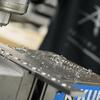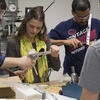Bachelor of Science in Mechanical Engineering
Earn a Bachelor of Science in Mechanical Engineering and develop the skills to conceptualize the next generation of engines, instruments, robots and vehicles. Position yourself to design the advanced machinery of the 21st century in the oldest of engineering disciplines. The types of problems mechanical engineers could work on include
- adapting machines and mechanical systems to use renewable energy;
- affecting digital technology and the life sciences through nanotechnology;
- designing power grids, hydraulic pumps, automated manufacturing systems; and more.
Becoming a mechanical engineer requires the skill to model a mechanical design concept graphically, mathematically and in three dimensions. In addition, mechanical engineers must be able to predict how the mechanism will use/convert energy and perform under stress. Consequently, through the 128-credit hour curriculum, Mechanical Engineering BS majors study
- forces in static and dynamic systems,
- mechanics of solids and fluids,
- principles of thermodynamics,
- processes of heat and energy conversion, and
- properties of materials.
You must also study rigorous mathematics for the Mechanical Engineering BS, through differential equations and engineering statistics. Moreover, you will develop competency in producing engineering graphics and using computer-aided design (CAD) techniques.


